Illinois Crop Update – May 16, 2025
Steve Brand – Commercial Agriculture Specialist
Stephenson County
Soil Conditions: Mildly Dry (soil is drier than normal, plant growth may have slowed)
Scouting was done in Stephenson County. Overall, the field conditions are very dry with May only bringing 1.1″ across the area so far. Temperatures have been in the upper 70s and low 80s this week with lows in the upper 40s and 50s. There are some potential rain events coming in the next week to add some moisture back into the soil. A large majority of fields have been planted and pre-emerge and posts are being applied.
Corn has emerged in a majority of fields. Plants are healthy with good vigor from abundant sunshine. Growth stages are between emergence and V2 pushing V3. Despite the dry weather, the residual soil moisture has produced uniform emergence.
Soybeans are beginning to emerge. By the end of the weekend most fields should emerge, but as of Wednesday only a small amount of fields had beans breaking through. Those beans were at the VE emergence or VC unifoliate unfolding growth stages. Top soils were dry but no crusting due to the lack of rain, and the beans were having no issue breaking through the surface.
Wheat is at Feekes 10 or boot growth stage. The head is fully developed and about 2/3 the way up the leaf sheath. Head emergence is just around the corner with the warm weather. Fungicide sprays will be applied in short order as well once heads emerge. Plants looked healthy with low disease within the wheat stand.
Overall, a great week for heat units and growth on the major cash crops in NW Illinois and across all of northern IL. The rain potential in the next week will go a long way after a relatively dry spring and a dry winter for crop growth.
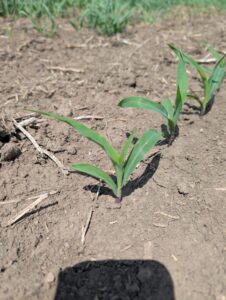
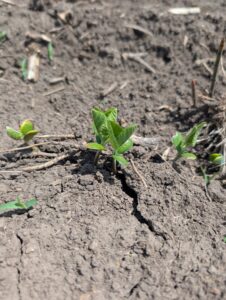
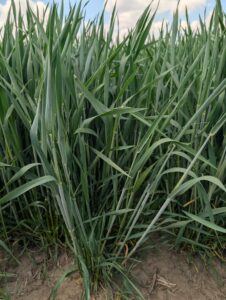
Russ Higgins – Commercial Agriculture Specialist
Grundy County
Soil Conditions: Mildly Dry (soil is drier than normal, plant growth may have slowed)
A busy planting week for most in NE Illinois. Above average temperatures this week provided several days accumulating at least 17 GDUs (base 50) per day. The favorable conditions for germination and seedling growth also extended to several problematic weeds including waterhemp and marestail. Early recognition of these and other weed species is important because post management strategies become challenging as the weeds reach critical sizes. Several areas missed recent precipitation events, and we have received reports of disappointing soy stands in earlier planted fields. Growers are encouraged to evaluate crop emergence to determine if replant is a viable option.
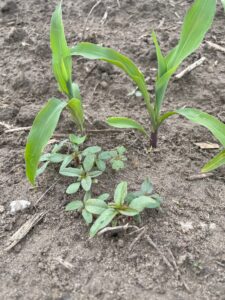
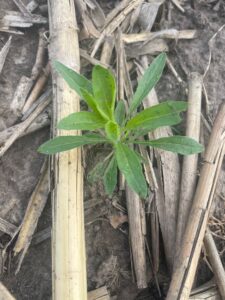
Talon Becker – Commercial Agriculture Specialist
McLean County
Soil Conditions: Mildly Wet (soil is wetter than normal, local vegetation is healthy)
During my survey on Tuesday of this week (5/13), I made it circuit around the eastern half of McLean County. When I started my survey in the southeast corner of the county, soil moisture in fields was near normal to slightly dry on some of the hilltops. However, pop-up showers were prevalent that afternoon, and by the time I reached the northern part of the county, there was water standing in headlands, low areas in fields, and roadside ditches. So, although I’ve indicated the soil moisture conditions were “mildly wet” for this report, the truth is that is a county average with quite a bit of variability across the county at the time of my survey.
Before those pop-up showers hit, there were planters rolling in the fields. At least half of the fields I observed in my survey had emerged crop, and the majority of the remainder had been planted with maybe only 10-15% unplanted. Most emerged corn is somewhere in the V1-V2 range, and most soybeans were still at VC with the first trifoliates just starting to unfold. Weed control still looked good in most fields; earlier planted fields are starting to show some sparse weed emergence.
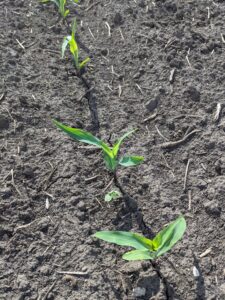
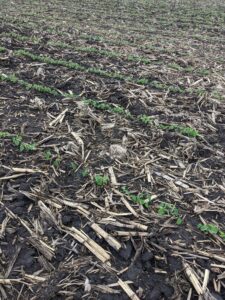
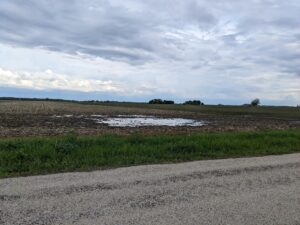
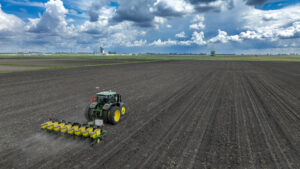
Reagan Tibbs – Commercial Agriculture Educator
Logan County
Soil Conditions: Near Normal
Favorable weather conditions this past week have allowed many producers to either finish planting or get close to finishing. Several parts of Logan, Menard, and Sangamon counties received a couple of tenths of an inch of rain, adding enough moisture to the soil. Many of the earlier-planted corn fields are in the V1-V2 stage, with the more recently planted fields in the VE stage. The same can be said with soybean fields; earlier-planted fields are in the VC-V1 stage, and later-planted fields are in the VE stage. Many producers have also started cutting alfalfa and other forages, with more having their first cutting on the ground by this weekend into next week.
Nick Seiter – Extension Field Crops Entomologist
Champaign County
Soil Conditions: Near Normal
Black cutworm will likely become large enough to cut plants in most of Illinois over the next week or so; this is a good time to scout, with a special focus on fields where winter annual weed control was poor and/or weedy vegetation was dying while crops were emerging. While black cutworm (along with variegated cutworm and some other species) are more of a problem where broadleaf vegetation was present early, look out for armyworm in wheat and in corn where grassy weeds/cover crops were present early – again, the situation that most commonly leads to injury is when the crop emerges while grassy vegetation is dying/drying down. Fields bordering wheat can be affected as well. We have nice, warm temperatures and (mostly) good soil moisture (perhaps a little too “good” in some areas), which will help seedling plants outrun early season insect injury. I have continued to receive only a handful of reports of injury – nothing out of the ordinary so far. Note – my own observations so far have been pretty limited to areas where we’re planting trials near Champaign and Monmouth; we’ll start to cover more of the state as our soybean insect sampling takes off in the next few weeks.
Dane Hunter – Commercial Agricultural Specialist
Marion County
Soil Conditions: Severely Wet (ground is saturated, standing water is abundant, flooding may be present)
Still very wet. Most of the fungicide is on wheat, which looks good where it hasn’t been drowned out. Still no planters out of the shed. Forecast calling for more rain.





